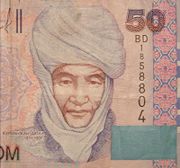
Kurmanjan Datka
Encyclopedia

Kyrgyzstan
Kyrgyzstan , officially the Kyrgyz Republic is one of the world's six independent Turkic states . Located in Central Asia, landlocked and mountainous, Kyrgyzstan is bordered by Kazakhstan to the north, Uzbekistan to the west, Tajikistan to the southwest and China to the east...
, known for her initial resistance to the annexation of that region by Russia
Russia
Russia or , officially known as both Russia and the Russian Federation , is a country in northern Eurasia. It is a federal semi-presidential republic, comprising 83 federal subjects...
.
Kurmanjan was born into a nomad
Nomad
Nomadic people , commonly known as itinerants in modern-day contexts, are communities of people who move from one place to another, rather than settling permanently in one location. There are an estimated 30-40 million nomads in the world. Many cultures have traditionally been nomadic, but...
ic family of the Mongush clan in the Alai Mountains. At the age of 18 she was supposed to be married to a man whom she did not see until her wedding day. When she met him, she did not like him and broke with tradition — first fleeing into neighboring China
China
Chinese civilization may refer to:* China for more general discussion of the country.* Chinese culture* Greater China, the transnational community of ethnic Chinese.* History of China* Sinosphere, the area historically affected by Chinese culture...
and later deciding to stay with her father, Mambatbai. In 1832, the local feudal lord, Alimbek, who had taken the title, "Datka", and ruled all the Kyrgyz of the Alai, was attracted by the young, vivacious woman, and married her. An instrumental politician in the increasingly decrepit Kokand
Kokand
Kokand is a city in Fergana Province in eastern Uzbekistan, at the southwestern edge of the Fergana Valley. It has a population of 192,500 . Kokand is 228 km southeast of Tashkent, 115 km west of Andijan, and 88 km west of Fergana...
khanate, Alimbek was murdered in the course of a palace coup in 1862 and Kurmanjan was recognized by the khans of Bukhara
Bukhara
Bukhara , from the Soghdian βuxārak , is the capital of the Bukhara Province of Uzbekistan. The nation's fifth-largest city, it has a population of 263,400 . The region around Bukhara has been inhabited for at least five millennia, and the city has existed for half that time...
and Kokand
Kokand
Kokand is a city in Fergana Province in eastern Uzbekistan, at the southwestern edge of the Fergana Valley. It has a population of 192,500 . Kokand is 228 km southeast of Tashkent, 115 km west of Andijan, and 88 km west of Fergana...
as ruler of the Alai and given the title of "Datka". In 1876 the Alai region was annexed by the Russian Empire
Russian Empire
The Russian Empire was a state that existed from 1721 until the Russian Revolution of 1917. It was the successor to the Tsardom of Russia and the predecessor of the Soviet Union...
. Recognizing the futility of resistance, Kurmanjan Datka persuaded her people to accept Russian overlordship.
During the subsequent continuing unrest and sporadic attempts by the local population to shake off Russian supremacy, gun-running and smuggling were profitable businesses and two of Kurmanjan's sons and two of her grandsons were charged with contraband trade and murdering customs officials. When her favourite son was sentenced to death, she refused the urging of some of her followers to effect a rescue, saying that she would not let her private hopes and ambitions be the cause of suffering for her people; she actually attended her son's public execution. The others were then exiled to Siberia
Siberia
Siberia is an extensive region constituting almost all of Northern Asia. Comprising the central and eastern portion of the Russian Federation, it was part of the Soviet Union from its beginning, as its predecessor states, the Tsardom of Russia and the Russian Empire, conquered it during the 16th...
and she essentially retired from public life.
In 1906, she was visited by Baron Carl Gustaf Emil Mannerheim
Carl Gustaf Emil Mannerheim
Baron Carl Gustaf Emil Mannerheim was the military leader of the Whites in the Finnish Civil War, Commander-in-Chief of Finland's Defence Forces during World War II, Marshal of Finland, and a Finnish statesman. He was Regent of Finland and the sixth President of Finland...
(later President of Finland) who was a colonel in the Russian army at the time. Mannerheim took her photograph. She died six months later. Kurmanjan Datka lived to be over 90 and was survived by two sons, two daughters, 31 grandsons, 57 great grandsons and six great-great-grandsons.
In 1995 a then newly founded women's committee was named after her. Now it is known as Women's Public Union “Erayim”.

